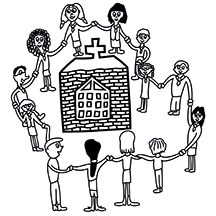


Keeping our children safe at St Michael’s is our highest priority. Parents and carers send their children to our school each day, trusting us to provide a secure environment in which their children will flourish. We have established a culture of safeguarding by teaching the children how to keep themselves safe and healthy and by making sure we have robust systems in place to protect the children of St Michael's from harm, whilst in our care. Our policies and procedures applies to all staff, governors, professionals and volunteers working in the school.
At St Michael's we adhere to the following guidelines:
Child Protection/safeguarding
The Designated Safeguarding Lead is Ms Asante and the Deputy Safeguarding Lead is Ms Aldridge. Ms Gillespie oversees Safeguarding, in her role as headteacher and includes safeguarding matters in her termly report to the Governing Body.
The two designated safeguarding governors are Ms Beryl Fielder and Ms Tilie Bentil-Mensah.
We work closely with a range of outside agencies, including Children’s Social Care. Sometimes we may need to share information and work in partnership with other agencies when there are concerns about a child's welfare. We will ensure our concerns about our pupils are discussed with parents/carers first, unless we have reason to believe that would be contrary to the child's welfare.
We actively support the Government's Prevent Agenda to counter radicalism and extremism.
Safeguarding map
Our safeguarding map gives a brief outline of the safeguarding arrangements that is in place at St Michael's. The information is not exhaustive.
Whistleblowing
The school is committed to conducting its business with honesty and integrity, and expects all staff to maintain high standards in accordance with their contractual obligations and the school’s policies and procedures. However, all organisations face the risk of things going wrong from time to time, or of unknowingly harbouring illegal or unethical conduct. A culture of openness and accountability is essential in order to prevent such situations occurring or to address them when they do occur.
Please see our whistleblowing policy for details about the process for whisteblowing concerns (in policy section of the website)
As outline in the whisteblowing policy, in the case where it is not appropriate for the person to raise their concern with the Headteacher, the concern should be reported to the chair of Governors, Beryl Fielder, bfielder3.209@lgflmail.org.
The local authority, Lewisham, has a statutory responsibility
for safeguarding
The Lewisham Safeguarding Children Board (LSCB) brings together all the main organisations who work with children and families in Lewisham, with the aim of ensuring that they work together effectively to keep children safe.
https://www.safeguardinglewisham.org.uk/lscp
The overarching purpose of the Lewisham Safeguarding Adults Board (LSAB) is to help and safeguard adults with care and support needs.
The MASH team (Multi-agency Safeguarding Hub) in Lewisham provided a single point of access to advice, information and support services for professionals working with vulnerable and at-risk children and young people.
Curriculum, including online safety
One of our main priorities as a school is to ensure that we work together to keep our children safe. We do this in many ways and one of the ways is by teaching our bespoke 'Healthy Body, Mind and Spirit Curriculum' (BMS curriculum), which we deliver in our weekly HRE sessions. The 4 core themes of the BMS curriculum are:
We also cover online safety as part of our computing curriculum. As well as this, we share key information regarding online safety with parents and carers via the weekly 'Wake Up Wednesday' poster. This national campaign is produced by National Online Safety.
See our Healthy Body, Mind and Spirit overview
The DFE outlines guidance as to how schools can ensure their pupils
understand how to stay safe and behave online as part of forthcoming
and existing curriculum requirement.
Photographs and Videos
Whilst lots of parents and carers really enjoy seeing photos and
videos of their children’s school life we are very mindful of our
duty of care towards all our pupils. We take the issue of
safeguarding very seriously and this includes the use of
photographic and video images.
We ask that parents, carers and relatives do not take any
photographs or videos at school productions, sports days or other
events, or if they do, that they take a photo of only their own
child, with no other children in the photograph. Photos or
videos must not be used in any way that could potentially place a
child at risk. This would include publishing images in any form of
print or on the internet including social networking sites. This is
emphasised before concerts and shows etc and where practical a
record of parents and relatives taking photographs or videos is
made.
Occasionally, the local press will be invited to take photographs of
school events and special achievements. We like to use photographs
of our children on our website and school blog and in our displays
around the school. When children join the school, parents are
asked for photo permission and the school does not use photos/video
without parental consent.
NSPCC
If you are concerned about a vulnerable child or would like advice, please contact the NSPCC
Tel: 0808 800 500
Email: help@nspcc.org.uk